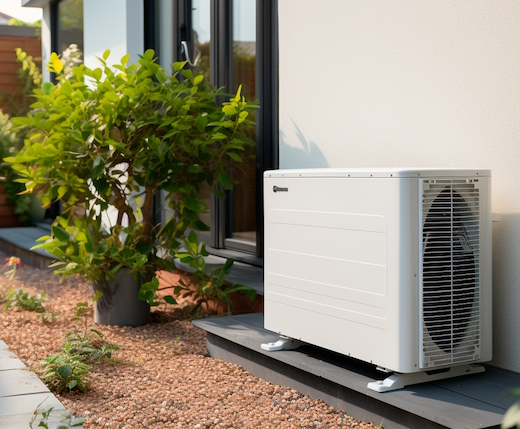Air Source Heat Pumps
Aptus Environmental and Electrical Control, offer professional air source heat pump repair and installation within a 30 mile radius of Newark.
Air Source Heat Pumps
Aptus Environmental and Electrical Control, providing trusted, local, certified tradesmen and quality services in Newark on Trent, Nottinghamshire, Lincolnshire, Derbyshire and South Yorkshire.
Making the Switch to Green is Easy!
We offer professional installation and service of air-to-water heat pumps and ground source heat pumps from manufacturers such as Ebac Nibe and Panasonic.
We can design and fit a system suited to your home, leaving you warm and worry free!
Heat pumps are 3 times more energy efficient than traditional gas boilers, meaning they will substantially reduce the carbon footprint of your home. Because they run on electricity, there’s also potential to make significant bill savings by using smart tariffs with cheaper off-peak rates.
The government offers a £7,500 grant towards installing a heat pump across England and Wales through the Boiler Upgrade Scheme.
Read More…

Our Services
We work hand in hand with suppliers and manufacturers to ensure that your installation will go smoothly and trouble free.

Ebac air source heat pumps
Ebac’s range of air source heat pumps offer a sustainable, economical and energy efficient way to heat your home all year round. Leading the way in environmentally friendly home heating options.

NIBE S735C
We’re excited to introduce the latest addition to our product portfolio – the NIBE S735C Exhaust Air Heat Pump. The S735C builds upon our award winning S735 with a new active cooling feature.

Panasonic Green Impact
Efficient solutions that reduce environmental footprint. Split and Multi Split systems for heating, air conditioning and quality of air. Wide range of solutions including technology that improves the indoor air quality.
Frequently Asked Questions
Why is it important to schedule preventative maintenance for a heat pump rather than waiting for a breakdown?
Why Schedule Preventative Maintenance for Your Heat Pump?
Think of preventative maintenance as your system’s health check—small steps now mean fewer headaches later. Rather than waiting for a breakdown on a cold winter morning, regular servicing keeps your heat pump running efficiently, maximising comfort and prolonging its lifespan.
- Routine checks catch minor issues before they become expensive repairs.
- Maintenance keeps components working at their best, so your system uses less energy and stays reliable.
- Optimised settings boost performance, helping you get the most from models like Ebac, NIBE, and Panasonic.
- Consistent care also protects your warranty and ensures your heat pump is always ready when you need it most.
By booking regular maintenance, you protect your investment and enjoy peace of mind—leaving you warm and worry free all year round.
How can regular servicing prevent minor issues from becoming costly repairs?
Why Regular Servicing Matters
Routine servicing is one of the best ways to keep your heat pump running efficiently and to catch small problems before they turn into major, expensive repairs. Qualified engineers can spot wear and tear early on, clean components, check for leaks, and adjust settings to make sure everything works as it should. This proactive approach means your system stays reliable, energy bills stay low, and you avoid the disruption of unexpected breakdowns.
By scheduling regular maintenance, you’ll help extend the life of your investment and keep your home comfortable year-round—without any nasty surprises cropping up down the line.
How does preventative maintenance benefit a heat pump's performance and lifespan?
The Importance of Preventative Maintenance
Keeping your heat pump in peak condition isn’t just about sidestepping inconvenient breakdowns—it’s also the secret to getting the best out of your investment, both in terms of performance and longevity. With regular maintenance, you ensure your system continues to deliver reliable warmth, optimal efficiency, and years of trouble-free comfort.
Here’s how preventative care pays off:
- Sustained Efficiency: Routine check-ups—like adding or changing air filters and cleaning indoor/outdoor units—help your heat pump run smoothly. These simple steps stop dust and debris from clogging your system, meaning your heat pump doesn’t have to work overtime (and cost you more on your energy bills).
- Minimised Wear and Tear: Upgrades such as installing anti-freeze valves and Y strainers play a big role in protecting the internal components. They guard against freezing and blockages, helping prevent the kinds of strain that lead to costly repairs or early replacement.
- Simpler, Cheaper Servicing: When you keep up with maintenance, future servicing is easier and less expensive. Clean, unclogged systems mean any maintenance work is quick and straightforward, and small issues can be spotted—and fixed—before they grow.
By investing a little time in regular upkeep, you’re effectively protecting your heat pump, maximising its energy savings, and extending its useful life—leaving you to enjoy a warm, comfortable, and worry-free home for years to come.
What are the potential consequences of neglecting professional maintenance for a heat pump?
What is F-Gas Registration and Why Does It Matter?
When it comes to repairing or maintaining air source heat pumps, having the right qualifications is essential—not just for peace of mind but for legal compliance too. F-Gas registration is a government-regulated qualification that ensures an engineer is properly trained and certified to safely handle fluorinated gases (F-Gases) used within heat pump systems.
But why is this important? Only engineers with F-Gas certification are legally allowed to work on the refrigerant circuits found in heat pumps. This protects both your system and the environment, as improper handling of refrigerants can cause leaks, harm the atmosphere, and pose health risks. Additionally, F-Gas registered professionals understand the complexities of heat pump systems and have the skills to troubleshoot and repair faults effectively.
When choosing an installer or repair service for brands like NIBE, Panasonic, or Ebac, always look for F-Gas certification. It’s your assurance that the work will be completed to the highest standard—and in accordance with UK regulations.
What are some proactive maintenace measures that can improve heat pump efficiency?
Proactive Maintenance Tips for Heat Pump Efficiency
Keeping your heat pump running at its best is about more than just expert installation—it’s also about a bit of care along the way. Here are some effective steps you can take to help your system work efficiently and last longer:
- Regularly clean or replace filters: This helps maintain good airflow and ensures your system isn’t working harder than it needs to.
- Install anti-freeze protection: Adding anti-freeze valves can safeguard components during cold snaps, minimising wear and avoiding unexpected breakdowns.
- Use strainers to catch debris: Y strainers are handy additions that trap particles before they can enter and clog up the system, making routine maintenance much easier.
By investing in these straightforward measures, you’ll reduce the risk of blockages and inefficiency, ensuring your heat pump operates smoothly year-round.
How can regular checks and adjustments of antifreeze levels extend the life of a heat pump?
Keeping Your Heat Pump in Top Shape: Antifreeze Matters
Your heat pump works hard for you all year, so keeping its antifreeze (glycol) at the right mix is more important than most people realise—especially if winter tends to bite hard where you live. When the glycol mixture is properly balanced, it guards your system against freezing and prevents pipe bursts or internal damage that can be costly to fix.
By checking and tweaking antifreeze levels regularly, you help your heat pump operate smoothly through freezing temperatures. This not only protects vital components from harsh cold snaps but also maintains consistent efficiency, ensuring your system performs reliably for years to come. In short, a few quick checks each year can mean a longer life and less hassle for your eco-friendly heating system.
Why is the correct dilution of antifreeze (glycol) important in a heat pump?
Why Antifreeze Dilution Matters in Your Heat Pump
Getting the glycol (antifreeze) mix just right in your heat pump isn’t overkill—it’s essential. The proper dilution helps prevent your heat pump from freezing up during those chilly Nottinghamshire and Lincolnshire winters. If the mixture is off, pipes or components can freeze and crack when temperatures drop, leading to costly repairs and inconvenient breakdowns.
Staying on top of your antifreeze level means your system keeps running smoothly and efficiently, year after year. Just like regular servicing or checking your smart tariff, it’s one of those simple habits that pays off big time—keeping your investment safe and your home reliably warm through every season.
Why is it important to have a skilled engineer repair a heat pump?
Why choose a skilled engineer for heat pump repairs?
When it comes to repairing a heat pump, experience and expertise really do make all the difference. Heat pumps combine hydraulics, electrics, and refrigerants in a single, complex system. That means a qualified engineer isn’t just a nice-to-have—they’re essential for pinpointing issues and carrying out safe, reliable repairs.
With a trained professional on the job, you benefit from:
- Accurate diagnostics – Skilled engineers understand the latest technology from trusted brands like Ebac, NIBE, and Panasonic.
- Safety first – Proper handling of electrical components and refrigerants protects both your home and household.
- Lasting efficiency – Repairs done right keep your heat pump running smoothly, helping extend its lifespan and avoid future headaches.
- Peace of mind – Regular checks from a certified specialist prevent small problems from turning into bigger, more expensive issues down the line.
So, whether you’re booking routine maintenance or facing an urgent repair, a qualified heat pump engineer ensures your system gets the specialist attention it deserves—leaving you warm, comfortable, and worry-free all year round.
What qualifications should a heat pump repair engineer have?
What Qualifications Should a Heat Pump Repair Engineer Have?
When it comes to repairing or servicing a heat pump, choosing the right engineer is essential for your safety and peace of mind. Heat pumps differ from old-fashioned gas boilers, so the qualifications required are a bit different too.
The main certification to look for is F-Gas registration. Only engineers with F-Gas credentials are legally allowed to handle the refrigerant circuit in your heat pump. This isn’t just a tick-box exercise—F-Gas registered professionals are trained and certified to work safely with the specific gases that keep your system running efficiently.
A great heat pump engineer should also:
- Understand how various heat pumps operate (air-to-water, ground source, and beyond)
- Demonstrate strong troubleshooting and fault-finding skills
- Hold experience with brands such as Panasonic, NIBE, Ebac and other leading manufacturers
- Stay up-to-date with the latest advances and regulations in heat pump technology
By ensuring your engineer ticks these boxes, you know your system is in qualified, capable hands—keeping your home comfortable all year round.
What is F-Gas registration and why is it necessary for heat pump repairs?
What is F-Gas Registration and Why Does It Matter?
When it comes to repairing or maintaining air source heat pumps, having the right qualifications is essential—not just for peace of mind but for legal compliance too. F-Gas registration is a government-regulated qualification that ensures an engineer is properly trained and certified to safely handle fluorinated gases (F-Gases) used within heat pump systems.
But why is this important? Only engineers with F-Gas certification are legally allowed to work on the refrigerant circuits found in heat pumps. This protects both your system and the environment, as improper handling of refrigerants can cause leaks, harm the atmosphere, and pose health risks. Additionally, F-Gas registered professionals understand the complexities of heat pump systems and have the skills to troubleshoot and repair faults effectively.
When choosing an installer or repair service for brands like Panasonic, NIBE, or Ebac, always look for F-Gas certification. It’s your assurance that the work will be completed to the highest standard—and in accordance with UK regulations.
Around £100 per year
savings
The benefits of a heat pump include:
- Carbon savings of up to 70% compared to a gas boiler
- Bill savings of around £100 per year compared to a gas boiler if used effectively with a smart tariff
- They’re 3 times more energy efficient than traditional gas boilers
- They remove the need for any imported gas in your home, contributing to UK energy security
- They’ll become greener every year as the UK electricity grid continues to decarbonise
